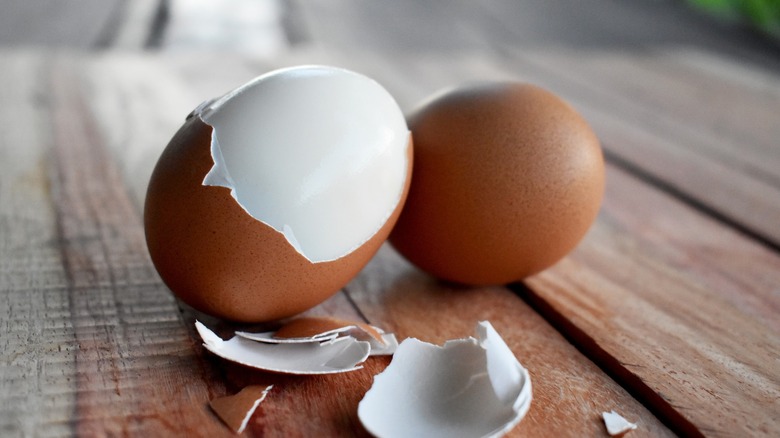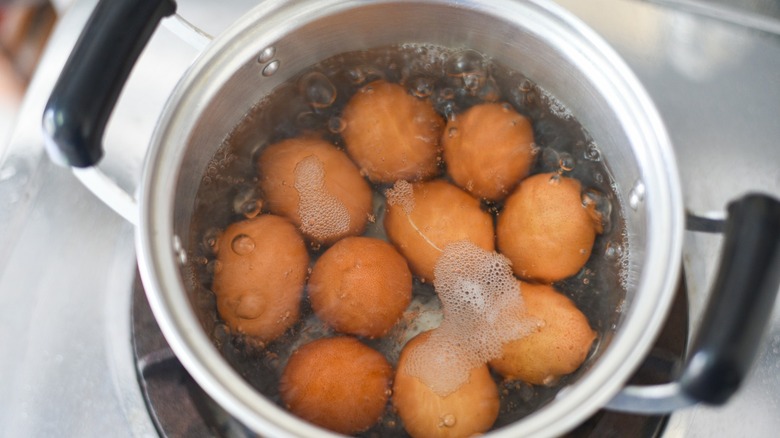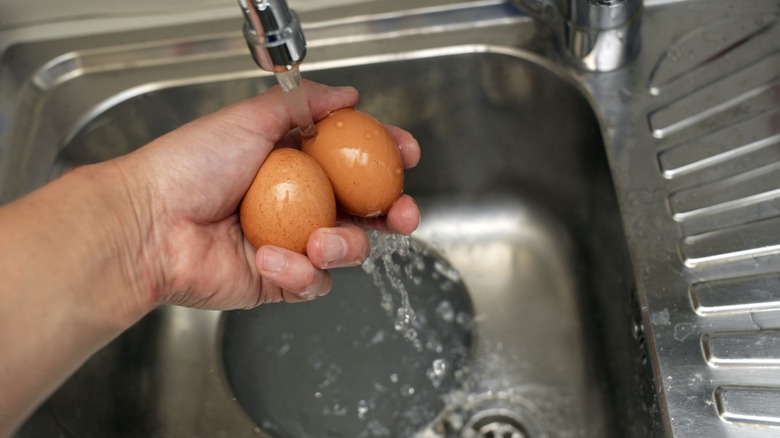How To Peel Hard-Boiled Eggs
Peeling hard-boiled eggs might just be one of the most deceptively tricky cooking tasks. It seems simple enough: Just take your egg out of its boiling water bath, crack it open, and remove the shell, right? However, anyone who has attempted this knows the perils of scalding egg white on their fingers or the frustration of a stubborn shell that leads to tearing the egg in half. Fortunately, there are some tricks to make the process of reaching the inside of a hard-boiled egg significantly less painful.
The most important rule when peeling hard-boiled eggs is to soak them in a bowl of ice-cold water immediately after removing them from the stove. This not only cools the eggs and prevents burns but also helps the whites separate from the shell, as the cold temperatures cause the soft parts to contract. This isn't an instant process; you'll want to let the egg sit for a few minutes to ensure it cools completely. Another helpful tip is that older eggs have looser membranes, making them easier to peel than freshly purchased ones. So, a hard-boiled egg that has been in your fridge for a while will generally be easier to peel than one that's fresh from the store. However, if you do use a fresh egg, add a small splash of white vinegar to the water as the eggs boil to encourage separation.
Why are hard-boiled eggs so hard to peel?
The reason hard-boiled eggs can be difficult to peel lies in the membrane — eggshells often adhere strongly to the cooked insides. This is because the keratin in an egg's membrane, the same structural protein found in hair, nails, and the outer layer of skin, binds to the egg whites at high temperatures and under acidic conditions. However, a less acidic environment, indicated by a higher pH value, can help detach the membrane, so balancing acidity is crucial for easier peeling.
The detachment process occurs gradually as carbon dioxide evaporates from uncooked eggs, making older eggs easier to peel than fresher ones. That's why some people recommend adding a teaspoon of baking soda — an alkaline powder that reduces acidity — to make the egg easier to peel. Conversely, others suggest that boiling an egg in white vinegar, an acidic substance, will dissolve the calcium carbonate in the shell, achieving the same effect.
A cold water bath is key
Peeling a hard-boiled egg often leaves behind small pieces of shell that you don't want in your food. To catch the residue, it helps to crack and peel the eggs over the same bowl of ice water you used to cool them. You can also go a step further and peel the egg under a stream of cold running water to wash away any remaining shell pieces or membrane.
Some experts claim that submerging eggs in a pot of cold water before boiling also helps, but this isn't entirely true. The myth likely originates from the fact that shocking eggs with drastic temperature changes does loosen their shells; however, this is more crucial after the boiling process, when the whites have already hardened and the membranes have tightened their grip.
If there is any benefit to boiling a cold egg, the temperature of your refrigerator should suffice. Of course, even with all these tips, there's still plenty of room for error. But keep practicing, and you'll become an egg-peeling pro in no time.



